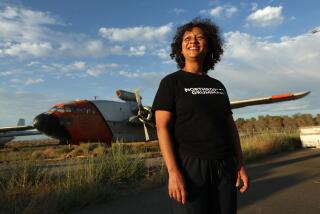Idled Factory Town Seeks Salvation Via Education
- Share via
MARTINSVILLE, Va. — It’s 11 o’clock on a Monday morning, but people are milling about on sidewalks and porches with nowhere to go. Nearby, the textile and furniture factories where many once worked stand idle in fields of weeds.
Before thousands of manufacturing jobs were lost in Martinsville and surrounding Henry County, it hardly mattered that fewer than one in 10 residents had a bachelor’s degree. Now, however, companies won’t move here and many residents can’t find work. Youngsters with promise head elsewhere for college, and aren’t inclined to return to a place where unemployment runs at a state-high 14%.
But Martinsville has one thing going for it that other factory towns don’t: a community foundation with $200 million, and a mission to repair the region’s social fabric.
Leaders of the Harvest Foundation, funded by the sale of the community hospital, think that the area’s best hope for rebirth is an intensive, academically innovative university, mixing the practicality and efficiency of a community college with the rigor of a four-year school.
The “New College of Virginia” they have proposed would let traditional, college-age students and older people with workforce experience earn a bachelor’s degree in only 28 months. If the state agrees to build and support it, the foundation has pledged $50 million -- enough, it says, to keep tuition as low as $1,546 per year in an area where per capita income is about $17,000.
Backers say it’s their best bet for transforming the region’s economy and a culture in which higher education has never been a major aspiration.
“The big thing is creating a changing sense of self-value for local people,” said George Lester, a businessman whose family ties to the area go back 200 years. He has pledged an empty former textile factory he owns and $250,000 to the college upon accreditation. “It’s a lifeline, a transition from the 20th century to the 21st century. It’s a chance to lead rather than follow.”
Despite the challenge grant, getting the new college built may never happen. Previous attempts to lure a university here have failed. Some think that backers are being overly optimistic about what such a school could accomplish, and competition over money is already fierce from existing state schools.
Gov. Mark Warner has indicated support for the project, as have the two presumptive nominees in this year’s governor’s race. But earlier this month, the State Council of Higher Education for Virginia declined to endorse it, recommending that the General Assembly do more research on how much demand there would be, and whether the college would be the best use of state resources.
If legislators insist on acting, the education council indicated that it favors a counterproposal from Longwood and Old Dominion Universities -- public colleges elsewhere in the state -- to expand partnerships with the community college a few miles outside Martinsville.
Virginia hasn’t created a new university since 1882, but has been well-served by an efficient strategy of expanding existing universities and building branch campuses, the council said. The “2+2” partnership it favored would be already accredited and would cost the state $4.9 million per year, compared to $9 million for the new college.
“Let’s try a collaborative approach and see what happens instead of taking millions of dollars and putting it into something that, maybe it will work and maybe it won’t,” Longwood President Patricia Cormier said.
But the education council acknowledged in its report that at public hearings, residents made clear that they consider that option inferior and that the region “deserved” its own four-year college.
Backers of the new college say they won’t be derailed by the council’s report. They argue that the existing state university system isn’t serving the region. The University of Virginia is highly regarded, but 120 miles away and tough for many here to get into. Other state schools are more accessible, but supporters of the new school say they only draw locals away.
“I don’t think they do anything, other than they got two football players from here,” said Ronald Carrier, a former president of James Madison University who transformed that school from a backwater teacher’s college to a prominent regional university. He has been hired by the foundation to lead the Martinsville project.
The community college approach, Carrier said, can’t accomplish the physical, economic and cultural makeover that the area requires.
“Community colleges transform individual lives,” said Carrier, 72, whose bluntness earned him both admirers and enemies at James Madison. “They do not transform communities.”
He wants the school highly visible, in the center of town, where it will make a statement about the role of higher education in the life of the community.
Carrier says Martinsville’s unusual circumstances require something new, and he says the program could serve as a model for other depopulating regions (Martinsville’s population of 15,400 is expected to decline about 3.5% by 2010, and surrounding Henry County’s more than 6%).
The proposal blends on-site and online learning, community service, internships and programs in local schools. The residential component would be housed partly in the now-empty Tultex textile plant near the city center, where 2,500 people once worked. Half the coursework would come from a liberal arts program; the other half would lead to a degree in fields like computer graphics, management and commercial art. Carrier hopes to enroll the first students in July 2006.
He says American higher education has accommodated evolution from seminaries to liberal arts colleges, universities and community colleges. Now, he says, the country needs something more rigorous than a trade school degree, but affordable and without the inefficiencies like idle classrooms, twice-weekly courses and three-day weekends that clearly drove him batty during his tenure leading a traditional four-year college.
But others argue that what’s really inefficient is starting a college from scratch, rather than restoring recently cut support to established and accredited ones -- many of which serve parts of the state where the population is growing.
Cormier, the Longwood president, says the proposal is interesting, but simply too risky.
“You can do an accelerated [program] with students who graduated from high school with 4.0s,” she said. “It’s not so easy with underrepresented students.”
Carrier says he can graduate anyone willing to work eight hours a day for 28 months.
Martinsville faced a similar economic crossroads a century ago, when the local tobacco industry collapsed. Then it remade itself as a textile center, capitalizing on cheap labor and the proximity to cotton fields.
This time, college backers say, cheap labor won’t save Martinsville’s economy.
Harvest Foundation Board Chairman Douglas Payne, a local furniture executive, says his company sometimes has openings but even with the labor surplus can’t find people with the skills needed.
Payne says education like the GED programs his company offers utterly transforms workers, giving them not only skills but confidence.
A college, he and others say, could do even more.
More to Read
Sign up for Essential California
The most important California stories and recommendations in your inbox every morning.
You may occasionally receive promotional content from the Los Angeles Times.











